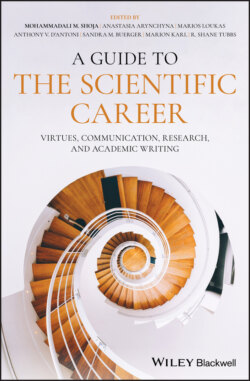Читать книгу A Guide to the Scientific Career - Группа авторов - Страница 78
7.1 Introduction
ОглавлениеI have found there is a wonderful harmony in the complementary truths of science and faith. The God of the Bible is also the God of the genome. God can be found in the cathedral or in the laboratory. By investigating God's majestic and awesome creation, science can actually be a means of worship
(Francis Collins 2007).
The aim of this chapter is to comment on the underlying motivations, values, and assumptions in scientific inquiry and biomedical practice as part of a quest for the truth about the world and our place within it. It is possible for the medical scientist to seek the truth and bear witness to the truth as it is reflected in the empirical reality of the world. In so doing, the spiritual scientist acts in harmony with God's created order, and his or her research will bring that order more fully to light.
While scientific endeavors reveal new knowledge and researchers labor to exchange this information, wisdom is necessary to discern between knowledge that brings about benefit and that which brings about harm. Hence, the goals of any research activities are informed in part by the researcher's consideration of what is beneficial and what requires prudence; for example, how medical science contributes to the health of a population. When we forthrightly address the question of what is beneficial, we begin to discern the animating purposes of research. To conduct medical research that better serves patients' needs, researchers must come to a deeper, more accurate understanding of what practices are truly beneficial to the welfare of their patients.
Some scientists view their research practices in the light of spirituality. We propose that, as these scientists seek out harmony in God's created order, their practice takes on a vertical dimension linking their medical practice and research with service to the Divine. For such individuals, their development as scientists coexists with a belief in God that may enrich their experiences and embolden their research endeavors.
The ways in which religion and spirituality impact health, medical care, and research are intensively studied and vary across the globe (Flannelly et al. 2004). At minimum, medical researchers should see themselves as an integral part of the healthcare system and are accordingly obliged to reflect on how their scholarship can be applied to improve patients' lives, or the well‐being of society in general. Such purposes can guide research activities and remind the scientist that serving humanity is an expression of serving one's God.
We must bear in mind that we may never obtain a completely objective grasp on reality, nor can science answer all of our questions. Scientific research remains powerless to provide answers to profound human questions such as what is the meaning of life or what happens after we die? Modern scientific inquiry focuses on that which is quantifiable, and such questions do not lend themselves to scientific methods of quantification.
To care for the sick is a privilege and a responsibility at the same time The responsibility of those involved in the act of care, doctors and researchers, is to ensure that the medical research together with the practice of medicine benefits the good of their patients. It is not enough merely to advance science and increase knowledge; science should ultimately serve the welfare of individuals and their communities. Medical research and medical practice are inseparable dimensions of caring for patients. Research remains an essential part of the clinical profession and the quality of research is directly reflected in the development of the discipline. Therefore, the education and growth of both researchers and practitioners should aim not only to teach concepts, but also to form character. The virtues that apply to clinical practice also apply to research. As such, we propose that scientists develop their character along two planes.
The vertical plane is concerned with internal moral formation of the virtues that a scientist must acquire to be a good person (e.g. justice, honesty, humility, graciousness), as well as cultivating the virtues expressed in serving others (e.g. kindness and love) – all while nourishing a relationship with God.
The horizontal plane is concerned with societal influence and the role that medical research plays in serving humanity. This plane aims to align research endeavors in ways that benefit society while respecting appropriate limits to the scientific quest for progress and knowledge.
